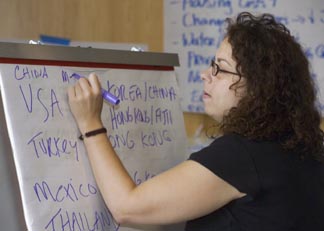Union women from around the world meet to learn at Cornell
By Linda Myers


More work in fewer hours for less pay, and anyone who can't keep up gets fired. That's what it's like to wash and pack bananas in Guatemala for Wal-Mart, Carmen Molina told a room filled with union women from across the United States Aug. 8 and 9 at Cornell University. But U.S. union women can help by lending their support to their sister trade unionists in Central America, she said, and pressuring the big box retailer to change its practices.
Molina, a leader of Sitravi, the Banana Workers Union of Izabel, Guatemala, spoke at the 30th Annual Northeast Regional Summer School for Union Women, which took place at Cornell's Robert Purcell Community Center Aug. 7-12. The United Association of Labor Education (UALE) program was co-sponsored by Cornell's School of Industrial and Labor Relations.
Taking part were 160 women from locals of 21 U.S. unions as well unions in the United Kingdom, Ghana and Bermuda. Many of them shook their heads and clicked their tongues in dismay when Molina described her long work days with no bathroom breaks in the Guatemalan packing plant that employs her, take-home pay of $6 a day and a showdown in 1999 with armed thugs, who forced the leaders of her union to resign (they have since been reinstated).
"The impact of globalization on workers and, particularly, on women is a growing concern of the labor movement," said K.C. Wagner, university co-organizer of the UALE forum, "One World -- Many Union Women's Voices," and director of workplace issues at the ILR School's New York City offices.
"The forum's goal was to break down economics into a popular education format, creating learning opportunities for union women and empowering them to take local action," said Susan Tindall, union co-organizer of this year's forum, who is a member of New York State United Teachers, local 37-935, and an ILR labor educator.
Among the participants were members of the AFL-CIO and unions that recently broke ranks with the giant labor federation.
"It's not about who's president [of a union]," said Lisa Epps, of the Service Employees International Union (SEIU) education department. "It's about every worker helping to breathe life into [the labor movement] and get real benefits for working people, who deserve them so much. We must come together to gain real power. It's the only way."
"It's absolutely wonderful to take part, as an academic historian," said ILR Professor Ileen DeVault, who gave a mini-workshop on labor history for some attendees. "These women are involved in their own unions, they're enthusiastic, starving to learn, and they can make the connection between women and unions 100 years ago and their own experiences."
"Women are critical to the future of the American labor movement, constituting 46 percent of current union membership and the majority of the workforce yet to be organized," said Lois Gray, ILR associate dean for extension and public service and a founding faculty member of the summer school. "The skills, knowledge and self-confidence they acquire [in UALE summer schools] make a real difference in enhancing their role [in unions]."
"What binds us together is we're workers and women. Incredible things can happen when we come together," said Nedelka McClean, with SEIU local 1199's childcare fund, who has been coming to UALE summer schools since 1987, first as a student and then as a facilitator.
Among the broad range of subjects covered in summer school sessions and workshops were: women organizing for economic justice, globalization and worker solidarity; mobilizing around women's health issues; collective bargaining; legal rights for union members; conflict resolution; and stopping workplace sexual harassment.
Susanne Bruyere, ILR associate dean for outreach and former director of the school's Employment and Disability Institute, spoke at the opening session, encouraging union women to involve fully their union sisters with disabilities.
ILR Dean Harry Katz, speaker at the graduation event, discussed globalization and the future of the labor movement, including links between an active union movement, democracy and economic prosperity.
In addition to Cornell and the ILR School, sponsors were the AFL-CIO and the Coalition of Labor Union Women.
Media Contact
Get Cornell news delivered right to your inbox.
Subscribe